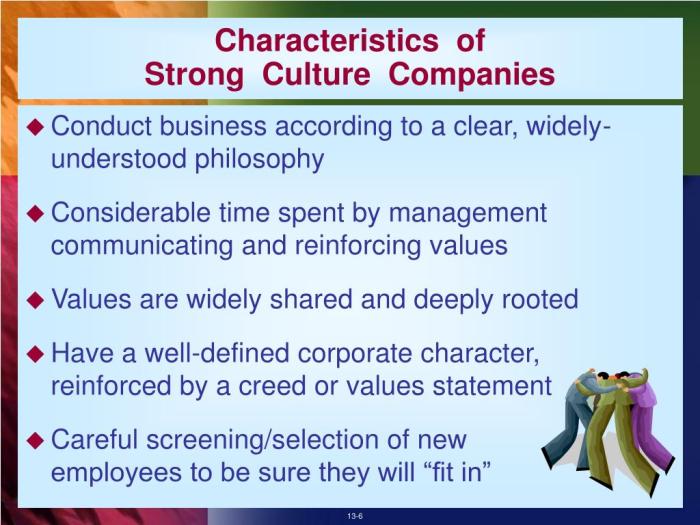The characteristics of unhealthy company cultures include a range of negative and detrimental factors that can significantly impact employee morale, productivity, and the overall success of an organization. These characteristics can manifest in various aspects of the workplace environment, from communication and leadership to employee morale and work environment.
Understanding and addressing these characteristics is crucial for fostering a healthy and positive company culture.
This comprehensive overview will delve into the key characteristics of unhealthy company cultures, exploring their impact and providing insights into how to create a more positive and supportive workplace environment.
Communication: The Characteristics Of Unhealthy Company Cultures Include

Unhealthy company cultures are characterized by a lack of open and transparent communication channels. Employees may feel unable to express their concerns or ideas, leading to a stifling of creativity and innovation. Negative or dismissive communication patterns, such as sarcasm, belittling, or interrupting, can create a hostile and unproductive work environment.
Examples of ineffective communication practices include:
- Lack of regular and timely updates from management
- Use of jargon or technical language that is not easily understood by all employees
- Emails or messages that are overly critical or accusatory
- Meetings that are poorly organized or unproductive
Leadership, The characteristics of unhealthy company cultures include
In unhealthy company cultures, leadership may be absent, unclear, or inconsistent. Leaders may fail to provide clear direction, set realistic expectations, or hold themselves and others accountable. This lack of accountability can lead to a culture of blame and finger-pointing.
Unethical or manipulative leadership practices, such as favoritism, nepotism, or micromanagement, can further erode trust and morale.
Employee Morale
Unhealthy company cultures often have low levels of employee satisfaction and motivation. Employees may feel undervalued, overworked, or unsupported. High turnover rates or absenteeism can be indicators of a toxic work environment. Initiatives aimed at improving employee morale, such as team-building exercises or employee recognition programs, may fail to address the underlying issues that are causing low morale.
Work Environment
Unhealthy company cultures lack a positive or supportive work environment. Employees may experience excessive stress or pressure, leading to burnout and decreased productivity. Unmanageable workloads or unrealistic expectations can contribute to a sense of overwhelm and frustration. The physical work environment may also be unpleasant or unsafe, with poor lighting, ventilation, or ergonomic conditions.
Values and Ethics
Unhealthy company cultures lack shared values or ethical principles. Conflicts of interest or unethical behaviors may be tolerated or even encouraged. Decisions may be made without regard to ethical considerations, leading to a culture of dishonesty and mistrust. Examples of unethical practices include:
- Misrepresentation of products or services
- Bribery or corruption
- Discrimination or harassment
- Environmental pollution or harm
Query Resolution
What are the most common characteristics of unhealthy company cultures?
Some of the most common characteristics of unhealthy company cultures include lack of open and transparent communication, absence of clear and consistent leadership, low employee morale, lack of a positive work environment, absence of shared values and ethical principles, lack of effective collaboration and teamwork, lack of constructive feedback and recognition, and lack of opportunities for employee growth and development.
What are the consequences of unhealthy company cultures?
Unhealthy company cultures can lead to a range of negative consequences, including decreased employee morale, reduced productivity, increased absenteeism and turnover, and damage to the organization’s reputation.
What can be done to improve unhealthy company cultures?
Improving unhealthy company cultures requires a comprehensive approach that involves addressing the root causes of the problems. This may include improving communication, strengthening leadership, boosting employee morale, creating a more positive work environment, establishing clear values and ethical principles, fostering collaboration and teamwork, providing constructive feedback and recognition, and creating opportunities for employee growth and development.


